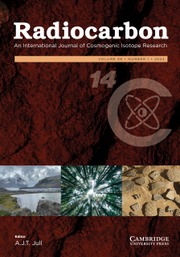Crossref Citations
This article has been cited by the following publications. This list is generated based on data provided by
Crossref.
Šupinský, Jozef
Kaňuk, Ján
Hochmuth, Zdenko
and
Gallay, Michal
2019.
Detecting dynamics of cave floor ice with selective cloud-to-cloud approach.
The Cryosphere,
Vol. 13,
Issue. 11,
p.
2835.
Bădăluţă, Carmen-Andreea
Perșoiu, Aurel
Ionita, Monica
and
Piotrowska, Natalia
2020.
Stable isotopes in cave ice suggest summer temperatures in east-central Europe are linked to Atlantic Multidecadal Oscillation variability.
Climate of the Past,
Vol. 16,
Issue. 6,
p.
2445.
Perşoiu, Aurel
Buzjak, Nenad
Onaca, Alexandru
Pennos, Christos
Sotiriadis, Yorgos
Ionita, Monica
Zachariadis, Stavros
Styllas, Michael
Kosutnik, Jure
Hegyi, Alexandru
and
Butorac, Valerija
2021.
Record summer rains in 2019 led to massive loss of surface and cave ice in SE Europe.
The Cryosphere,
Vol. 15,
Issue. 5,
p.
2383.
Sironić, Andreja
Alegro, Antun
Horvatinčić, Nada
Barešić, Jadranka
Brozinčević, Andrijana
Vurnek, Maja
Krajcar Bronić, Ines
Borković, Damir
and
Mikelić, Ivanka Lovrenčić
2021.
Carbon isotope fractionation in karst aquatic mosses.
Isotopes in Environmental and Health Studies,
Vol. 57,
Issue. 2,
p.
142.
Kern, Zoltan
and
Perșoiu, Aurel
2022.
A Review of Ice Core Drilling in Cave Environment – Challenges, Achievements and Future Directions.
Frontiers in Earth Science,
Vol. 9,
Issue. ,
Racine, Tanguy M F
Spötl, Christoph
Reimer, Paula J
and
Čarga, Jana
2022.
RADIOCARBON CONSTRAINTS ON PERIODS OF POSITIVE CAVE ICE MASS BALANCE DURING THE LAST MILLENNIUM, JULIAN ALPS (NW SLOVENIA).
Radiocarbon,
Vol. 64,
Issue. 2,
p.
333.
Racine, Tanguy M. F.
Reimer, Paula J.
and
Spötl, Christoph
2022.
Multi-centennial mass balance of perennial ice deposits in Alpine caves mirrors the evolution of glaciers during the Late Holocene.
Scientific Reports,
Vol. 12,
Issue. 1,
Kwiecien, Ola
Braun, Tobias
Brunello, Camilla Francesca
Faulkner, Patrick
Hausmann, Niklas
Helle, Gerd
Hoggarth, Julie A.
Ionita, Monica
Jazwa, Christopher S.
Kelmelis, Saige
Marwan, Norbert
Nava-Fernandez, Cinthya
Nehme, Carole
Opel, Thomas
Oster, Jessica L.
Perşoiu, Aurel
Petrie, Cameron
Prufer, Keith
Saarni, Saija M.
Wolf, Annabel
and
Breitenbach, Sebastian F.M.
2022.
What we talk about when we talk about seasonality – A transdisciplinary review.
Earth-Science Reviews,
Vol. 225,
Issue. ,
p.
103843.
Žebre, Manja
and
Gachev, Emil M.
2022.
Periglacial Landscapes of Europe.
p.
89.
Oliva, Marc
Fernández-Fernández, José M.
and
Nývlt, Daniel
2022.
Periglacial Landscapes of Europe.
p.
477.
Bartolomé, Miguel
Cazenave, Gérard
Luetscher, Marc
Spötl, Christoph
Gázquez, Fernando
Belmonte, Ánchel
Turchyn, Alexandra V.
López-Moreno, Juan Ignacio
and
Moreno, Ana
2023.
Mountain permafrost in the Central Pyrenees: insights from the Devaux ice cave .
The Cryosphere,
Vol. 17,
Issue. 2,
p.
477.
Oleksandrenko, A.
Appleby, P.G.
Duke, M.J.M.
Noernberg, T.
and
Shotyk, W.
2024.
Americium-241 in peat bogs as a global marker of the beginning of the Anthropocene: examples from Europe and North America.
Environmental Reviews,
Vol. 32,
Issue. 4,
p.
707.
Ravanel, Ludovic
Flinois, Guillaume
Jaillet, Stéphane
Malet, Emmanuel
Magnin, Florence
Rigal, Didier
Burnet, Hugo
and
Hobléa, Fabien
2024.
De la glace souterraine au-delà des limites de la cryosphère. Fonctionnement glaciologique et usages de la Grande Glacière du Parmelan (massif des Bornes, France).
Géomorphologie : relief, processus, environnement,
Vol. 30,
Issue. 3,


